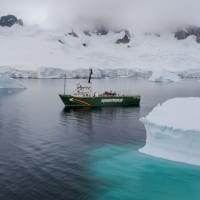Our annual report shows the work we undertook in 2019 to expose environmental abuse and to champion solutions that safeguard the long-term health of our planet.
None of this would have been possible without the help of ordinary people deciding to do something from where they are – from signing petitions and donating, to campaigning in their local communities.
Choose a section from the list below to get started.
Welcome
2019 was a year in which it frequently felt that the movement to protect our planet had finally come of age, and nowhere was this more evident than in the worldwide effort to confront the climate emergency.
Little more than a year after Greta Thunberg first protested alone outside the Swedish parliament, four million climate strikers took to the streets on 20 September to demand urgent climate action. David Attenborough sounded the alarm in a primetime BBC documentary, telling MPs we “can’t be radical enough” in our efforts to prevent climate breakdown. Extinction Rebellion became a household name.
Even the language we use to talk about the issue shifted: this was a time of climate emergency – the Oxford English Dictionary’s phrase of the year – with the UK parliament one of many local and national bodies to officially make that declaration.
Within this changing context, the role of Greenpeace increasingly involved holding power to account to deliver genuine action now. The inevitable risk is that while attention on our climate grows, politicians and companies respond with warm words while carrying on with business as usual or hiding behind vague promises for the future. We’re here to make sure that isn’t the case – and in 2019 we kept that focus crystal clear.
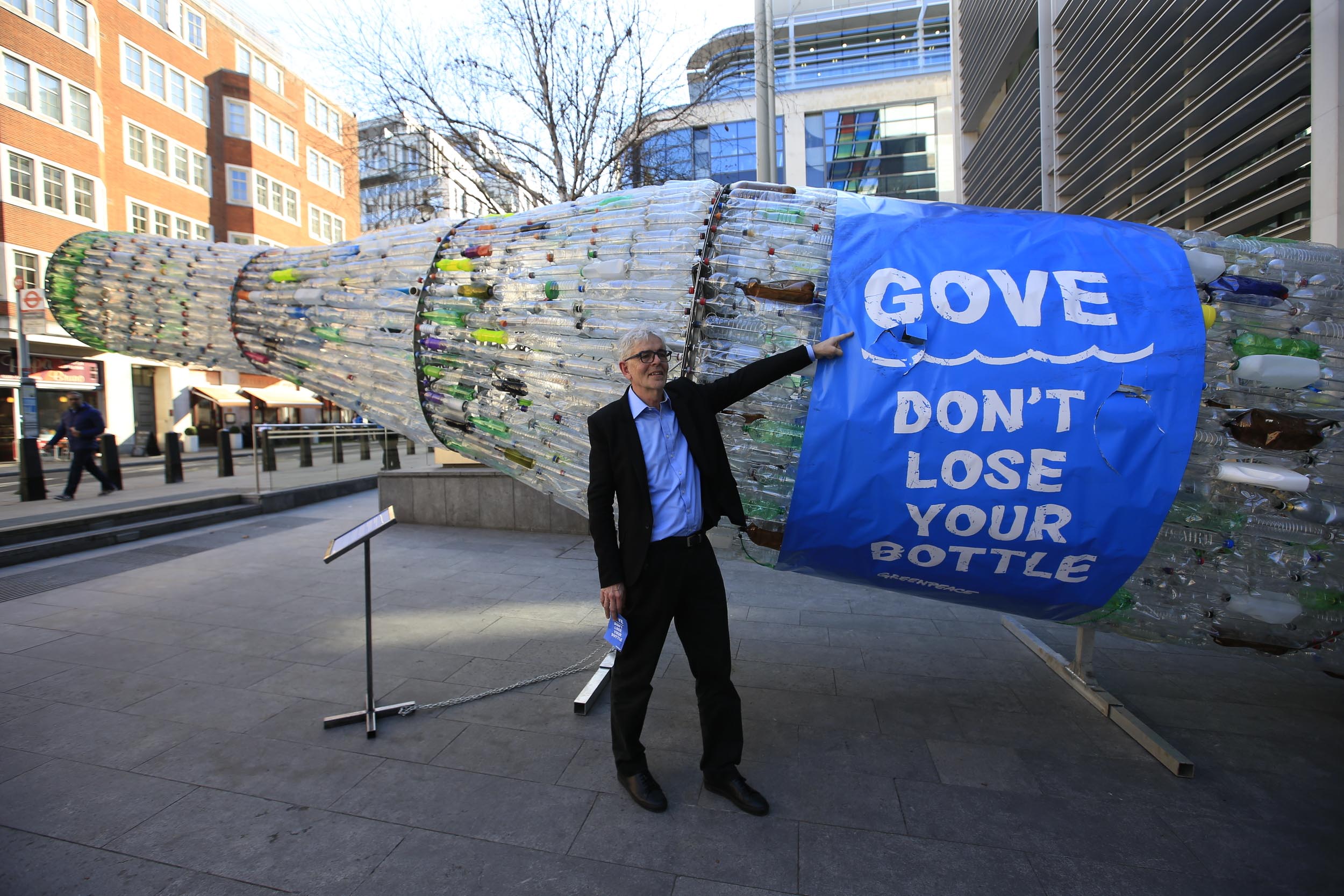
A 29 foot-long plastic bottle artwork was delivered to UK Environment Secretary Michael Gove to call for him to progress plans to introduce an all-inclusive deposit return scheme. © Paul Hackett / Greenpeace
Our climate manifesto, published in May, listed 134 urgent, evidence-based policy actions for the UK government to take to prevent climate breakdown. Our buildings need to be insulated, our transport system electrified, our natural habitats restored and protected, our tax system reformed to end oil and gas subsidies.
Throughout the year, we exposed and targeted the politicians and companies more interested in kicking the climate emergency into the long grass than basing every decision they make on these solutions, which are available to us today.
The climate emergency lies at the heart of everything we do, and our work to protect and restore the natural defences against climate change is another key element of what we’re doing. Principally that means protecting forests and oceans, which play a critical role as carbon sinks as well as being critically important for biodiversity.
Last year we sailed from Pole to Pole collecting evidence and raising awareness as part of our campaign to protect our oceans. We took on the forest destroyers setting the Amazon ablaze. And we targeted the investors who persist in keeping the finance flowing to toxic fossil fuel projects.
In everything we did, we stood shoulder-to-shoulder with millions of people worldwide who joined us to defend our natural world.
Together, our voices are now louder than ever before. We’re under no illusions about the powerful forces we face, but those governments and businesses hell bent on business as usual also know we are here to stay – and we are only getting stronger.
Millions of young people have become powerful advocates for change. Real opportunities exist in the coming years to protect our oceans, safeguard biodiversity and respond to the climate emergency with the real, tangible and urgent action it demands. Thank you for being with us as we work relentlessly to turn these opportunities into profound and lasting progress for our planet.
John Sauven
Executive Director, Greenpeace UK
Climate: 12 months of emergency action
With little more than a decade left to prevent catastrophic climate breakdown, we took on the companies and politicians fuelling the climate emergency – and, as campaigner Rosie Rogers explains, millions of people joined us to demand an end to business as usual.
A heatwave hit the UK – in February. Typhoons tore through East Asia. Wildfires devastated the Amazon, Indonesia and Australia. As extreme weather dominated the headlines in 2019, we targeted politicians, investors and industries through lobbying, peaceful direct action and work to support the climate strikes.
In April, we published our climate manifesto, outlining the 134 actions the UK government must take to lead the battle against climate breakdown. It brings together a wide range of urgent, feasible policy demands, including ending fossil fuel extraction, making buildings more sustainable, investing heavily in public transport and upgrading the power grid to support the shift to renewables. We then went to great lengths to make sure those in power understood what we expect them to do.
First, 40 Greenpeace supporters gatecrashed then-Chancellor Philip Hammond’s speech at Mansion House. Our campaigner Hannah took to the stage to deliver our own alternative speech, explaining why the gathered business leaders should be focusing on confronting the climate emergency, rather than fuelling it. Then-MP Mark Field then assaulted Greenpeace activist Janet, and the media coverage that followed sent the climate emergency to the top of the national news bulletins.
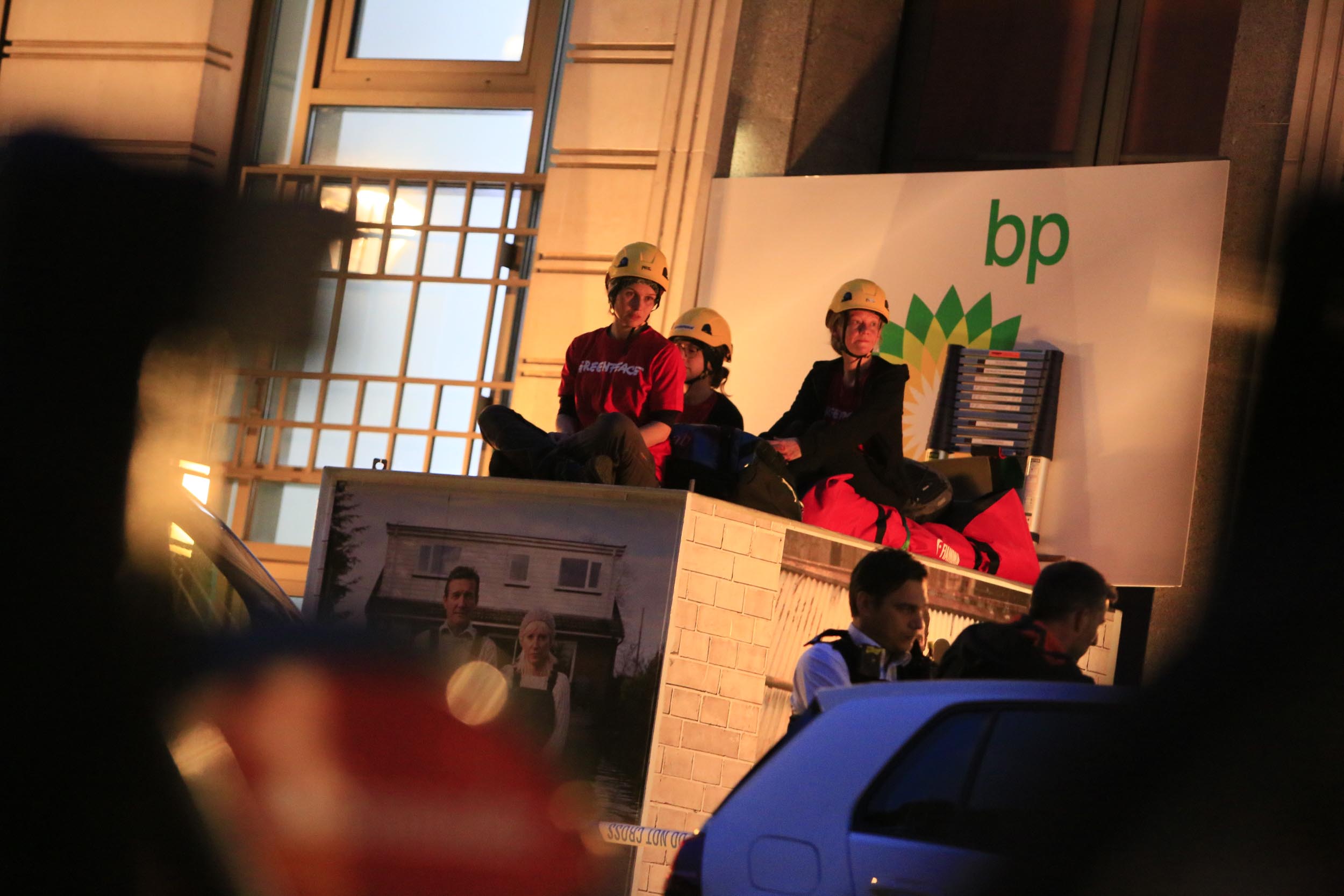
Greenpeace volunteers shut down BP Headquarters in central London demanding they switch to renewables or shut down as part of our Climate Emergency campaign. © Jiri Rezac / Greenpeace
A month later, Greenpeace protesters blocked Boris Johnson’s journey to Buckingham Palace on his first day in the job, giving our Executive Director John Sauven the chance to hand over a copy of the manifesto directly to the new PM. The live news coverage reached up to 24 million people.
Alongside urging politicians to change course, we also took on the big businesses threatening to send our climate spiralling out of control. Our main target was BP, which still puts just 3% of all its investments towards renewables.
On the eve of its AGM in May, we shut down BP’s London HQ, blocking the entrances using metal crates with Greenpeace supporters inside. Climbers hung huge letters spelling out “Climate emergency” above the main entrance, and hundreds of people joined us for a rally outside the building the following day.
Then, for 12 days in June, we thwarted the company’s attempts to drill for a new oil well in the North Sea. First, three teams of Greenpeace climbers boarded the rig and stopped it leaving Scotland’s Cromarty Firth, then our ship the Arctic Sunrise prevented the rig from reaching its drill site.
In the face of determined action by a small group of committed activists, a giant climate-wrecking company literally had nowhere to turn – resulting in a ‘crisis meeting’ with all the big oil execs, and legal action against Greenpeace.
Actions like these mean millions of people see who’s to blame for the climate crisis, as well as increasing pressure on the culprits to change. In October, in the same week the Royal Shakespeare Company dumped BP as a sponsor and the National Theatre cut its links with Shell, we interrupted the annual Oil and Money Conference dinner with a banner reading: “BP and Shell: climate criminals”. There’s simply no place for companies like BP and Shell to continue as they are.
Our efforts to bring about radical change at fossil fuel companies also involved targeting investors. We made sure questions about the climate emergency were asked at the AGMs of BP, Shell and also Barclays, which – as we detailed in our investor briefing “Failure to Transition” in May – continues to fund high-carbon infrastructure projects. In September, we also launched a global campaign to expose and challenge the links between the financial sector and the climate emergency.
Of course, no review of 2019 would be complete without a celebration of the impact of the wider movement – in particular the school climate strikers.
In September, more than four million people of all ages, from Bangkok to Buenos Aires, Cardiff to Kampala, went on strike to demand climate action. Here in the UK, we worked closely with the UK Student Climate Network, helping to coordinate hundreds of strikes across the country and encouraging our supporters to take part.
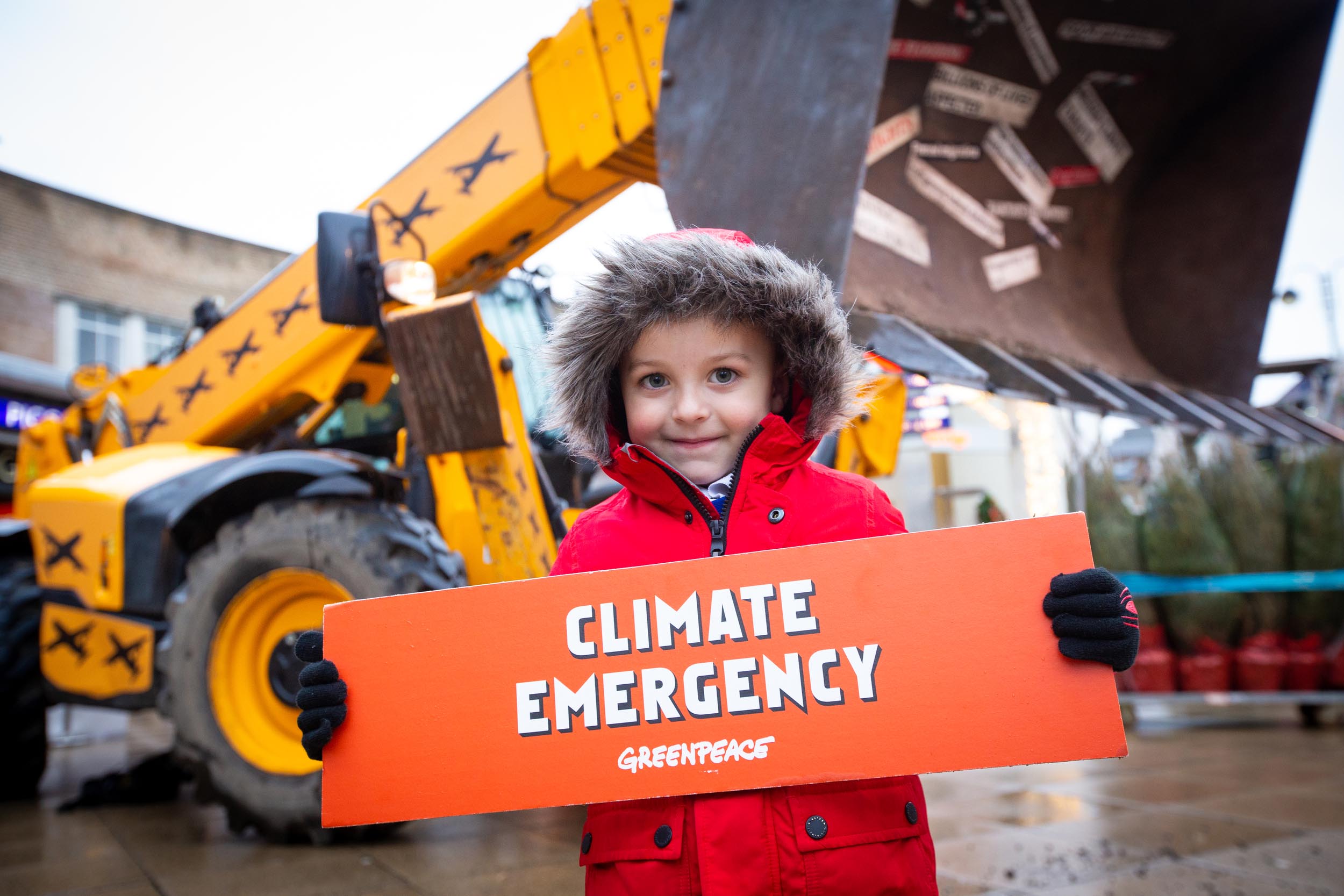
Greenpeace activists bring a bulldozer to Boris Johnson’s Uxbridge constituency during a protest against Heathrow’s proposed third runway. © Luca Marino / Greenpeace
By sharing our expertise and communications platforms, building a new UKSCN website and creating videos that were seen and shared by millions online, we helped to increase UKSCN’s list of supporters from 1,500 to 28,000.
The strikes offered a clear reason for optimism, and so did the launch of London’s Ultra Low Emission Zone (ULEZ) – following years of pressure from Greenpeace supporters. Under the scheme, drivers in a large area of central London are now charged based on the pollution their vehicle creates. It launched in April, and by November harmful gases from air pollution in the capital had dropped by a third.
If that was one transport scheme heading in the right direction for our climate, however, the proposed Heathrow third runway was the total opposite.
In November, we challenged the Prime Minister to come good on his 2015 promise to “lie down in front of those bulldozers and stop the construction of that third runway”. We even brought a bulldozer to his constituency for him to use. The PM declined to accept our challenge, but it was another occasion last year when we made it totally clear that our natural world is not up for negotiation.
“I’d promised myself I was going to live a quiet life, then there I was about to climb up an oil rig. The truth is that somewhere deep within my soul I’ve made the choice to do something.”
Oceans: fighting for protection, from Pole to Pole
As campaigner Will McCallum explains, our pioneering ship expedition built the case for a strong Global Ocean Treaty while our groundbreaking rivers study revealed the true scale of the plastic problem here in the UK.
In April, our ship the Esperanza set sail on an epic journey from the Arctic to the Antarctic. Our goal? Document and expose threats to our oceans including plastic pollution, deep sea mining, climate change and industrial fishing – and persuade the UN to agree a strong Global Ocean Treaty.
Scientists joined us in the Arctic, showing how a warming climate is affecting this unique ecosystem. From there we sailed to the Azores, capturing shocking footage en route of sharks being caught by industrial fishing vessels. We also released a report revealing how thousands of endangered sharks are killed each year because of a lack of protection.
As we passed over the Lost City – a spectacular formation of hydrothermal chimneys deep underwater in the mid-Atlantic – we published another study explaining how plans to mine the seabed for minerals risk driving species to extinction. To make sure the International Seabed Authority heard that message, we made a stop at its annual meeting in Jamaica, delivering a letter from 28 scientists expressing their concerns.
Back on the water, we found areas of the Sargasso Sea with more plastic pollution than the infamous ‘Great Pacific Garbage Patch’. And we discovered an unknown breeding and feeding area for humpback whales in French Guiana, in an area earmarked for oil drilling. Everywhere we sailed, the case for ocean protection grew.
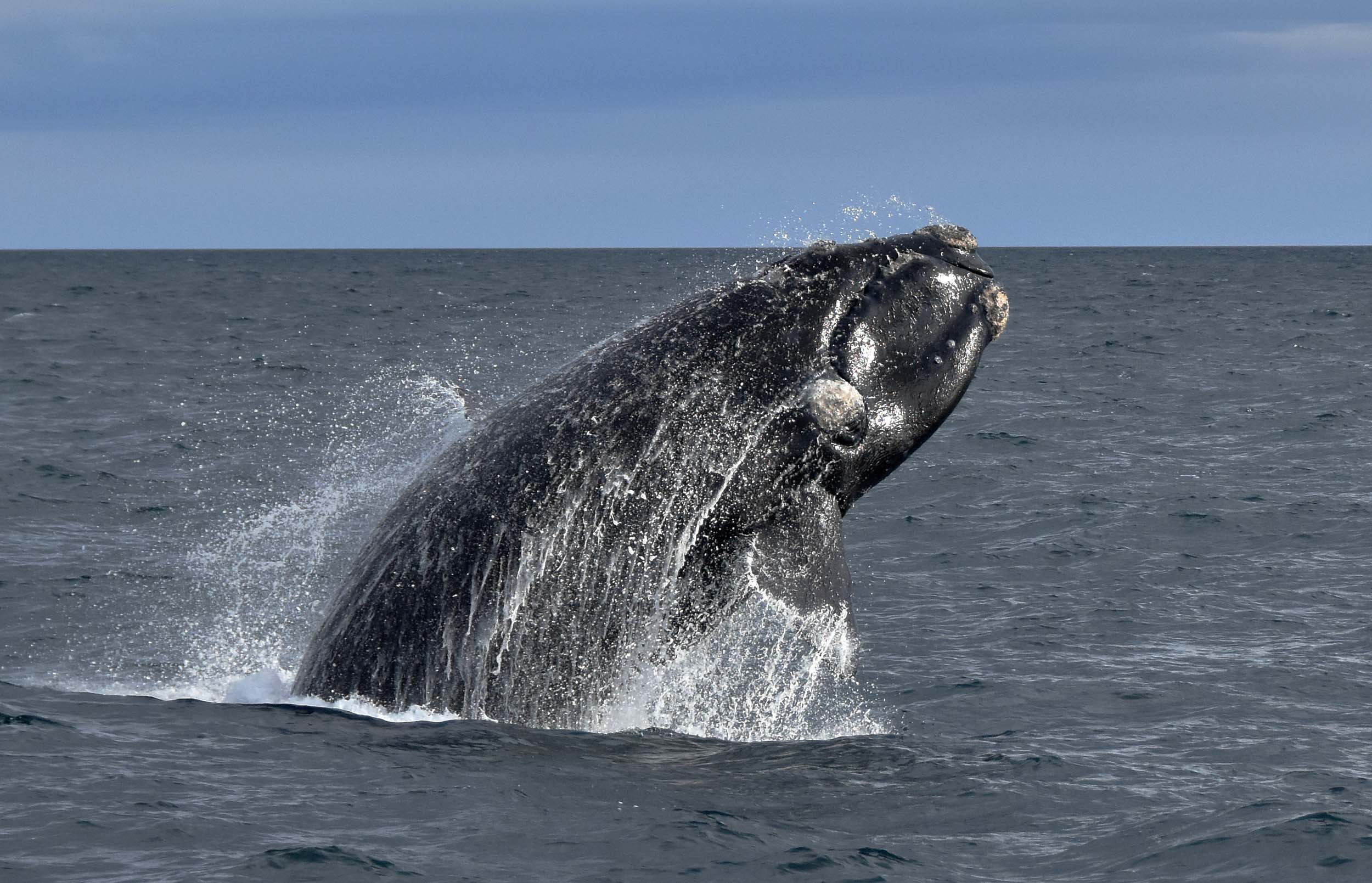
Southern right whale off the coast of Argentina, captured during our Pole to Pole expedition. © Santiago Salimbeni / Greenpeace
We detailed what that protection should entail in our landmark report, ‘30×30: a blueprint for ocean protection’. Created in collaboration with the Universities of Oxford and York, it maps out how a network of ocean sanctuaries could safeguard wildlife and mitigate climate change. Thanks to our lobbying efforts, the UK government went on to back our calls for a minimum of 30% ocean protection by 2030 – and has created a global alliance to unite other countries behind the target.
We also made great strides in highlighting dangers closer to home. Here in the UK, we undertook the first nationwide research into microplastic pollution in rivers, finding large amounts of microplastics in every river we tested. As a result of our findings, over 200 MPs backed our calls for strong measures to be included in the upcoming Environment Bill.
Finally, 2019 ended with positive news when, following our extensive campaigning and boardroom negotiations, Sainsbury’s pledged to halve its plastic footprint by 2025 – an industry-leading commitment and a massive mark of progress.
“Every single river we tested contained microplastics. Once microplastics are in the river, they become impossible to remove again, so we have to solve the problem at source.”
Forests: The battle against fires and broken promises
Our forests are among the best defences we have against climate and nature breakdown, but in 2019 companies broke their deforestation promises while the Brazilian government launched a devastating attack on the Amazon. As campaigner Anna Jones explains, we weren’t going to take that lying down.
We outlined the scale of the threats to our forests in “Countdown to Extinction”, our landmark report published in June. It showed how an area twice the size of the UK has been destroyed for commodities since the world’s largest consumer brands promised in 2010 to end deforestation by 2020.
The report drew on months of research: at the start of 2019 we contacted 50 of the brands asking for evidence of their efforts to cut deforestation out of their supply chains. Not one was able to show it had taken meaningful action, but we weren’t about to ignore their broken promises.
The fast food giants, who still buy massive amounts of meat and animal feed from forest destroyers, were firmly in our sights. In September, climbers hung giant banners reading “Fast Food Fries Forests” and “Burger King: Flame Grilling the Amazon” from Burger King’s flagship Leicester Square restaurant. Ten thousand people called the company’s switchboard as a result, with the BBC and Sunday Times following up on the story.
The Amazon was a big focus for our work throughout 2019 – a year when huge swathes of this priceless ecosystem were ablaze as farmers torched the land to clear it for agriculture. Brazil’s President, Jair Bolsonaro, fanned the flames of the crisis, weakening environmental protections and emboldening farmers to violently seize Indigenous land.
With trade talks ongoing between the UK and Brazilian governments, we launched a petition calling for negotiations to be suspended until Brazil guaranteed it would stop the Amazon being turned to ash.
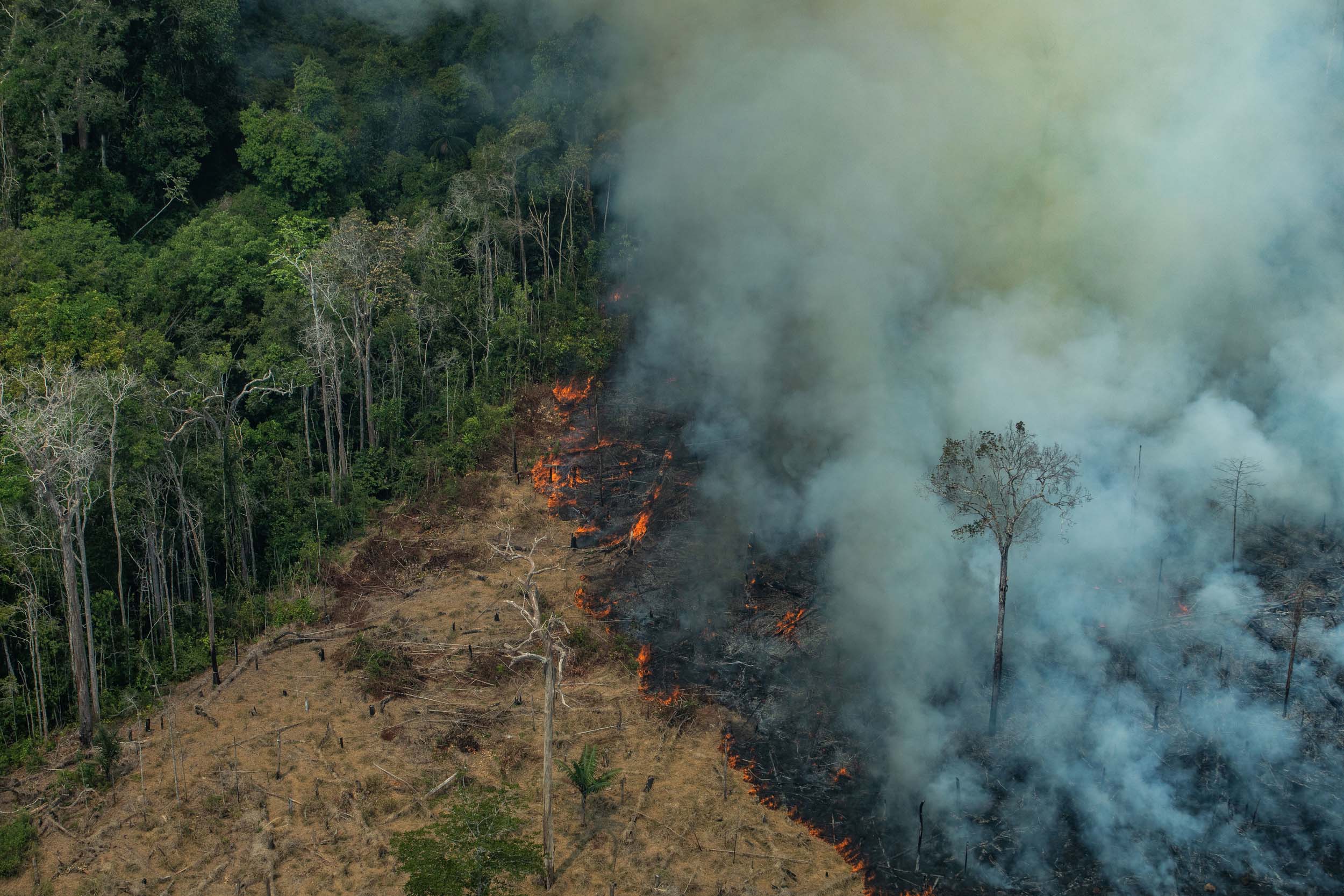
Forest fire devastation in Brazil’s Amazon taken during a Greenpeace overflight to document the fires’ extent and destruction. © Victor Moriyama / Greenpeace
We also worked with indigenous communities and other NGOs to get the issue noticed, organising a 35-day journey through Europe for 11 Brazilian Indigenous leaders. They asked EU officials and politicians to stop their lands being seized, and delivered a trade talks petition with 200,000 signatures to 10 Downing Street.
But while attention was growing, there was reason for frustration too. 2018 had ended with hope after the world’s largest palm oil trader, Wilmar, pledged to map and monitor its suppliers and stamp out forest destroyers.
In 2019, however, negotiations around the scope of the monitoring platform faltered. The company’s commitment to supply chain transparency was lacking, so we stepped back from the process with Wilmar and stepped up pressure on its brand customers. As the year drew to a close, we were also in discussions with other major partners about taking the monitoring platform forward. Our determination to protect our forests remains as strong as ever.
“We are here to show to the world… that we will not give in and we will not step back. Land for us is sacred, and no money can buy it.”
Strengthening the movement
In a year when the global movement to save our planet from climate catastrophe took on new and powerful forms, we focused on adding strength and value at every opportunity, explains campaigner Areeba Hamid.
While Greenpeace has been on the scene for decades, many new voices joined the global green movement – especially young climate activists, spurred on by Greta Thunberg.
Collaborative working is something we do lots of and do well, and we can be proud of the contribution we made in 2019 to help unite and support the people who share our concerns and our commitment.
The emergence of school climate strikers added new energy to the movement, as did Extinction Rebellion (XR) and a more outspoken David Attenborough.
We were privileged to be able to play a major role in supporting the UK Student Climate Network (UKSCN) with its mobilisation efforts for the global climate strike. We coordinated a coalition of NGOs, trade unions and more, uniting the broader movement and keeping the UKSCN front and centre of all communications.
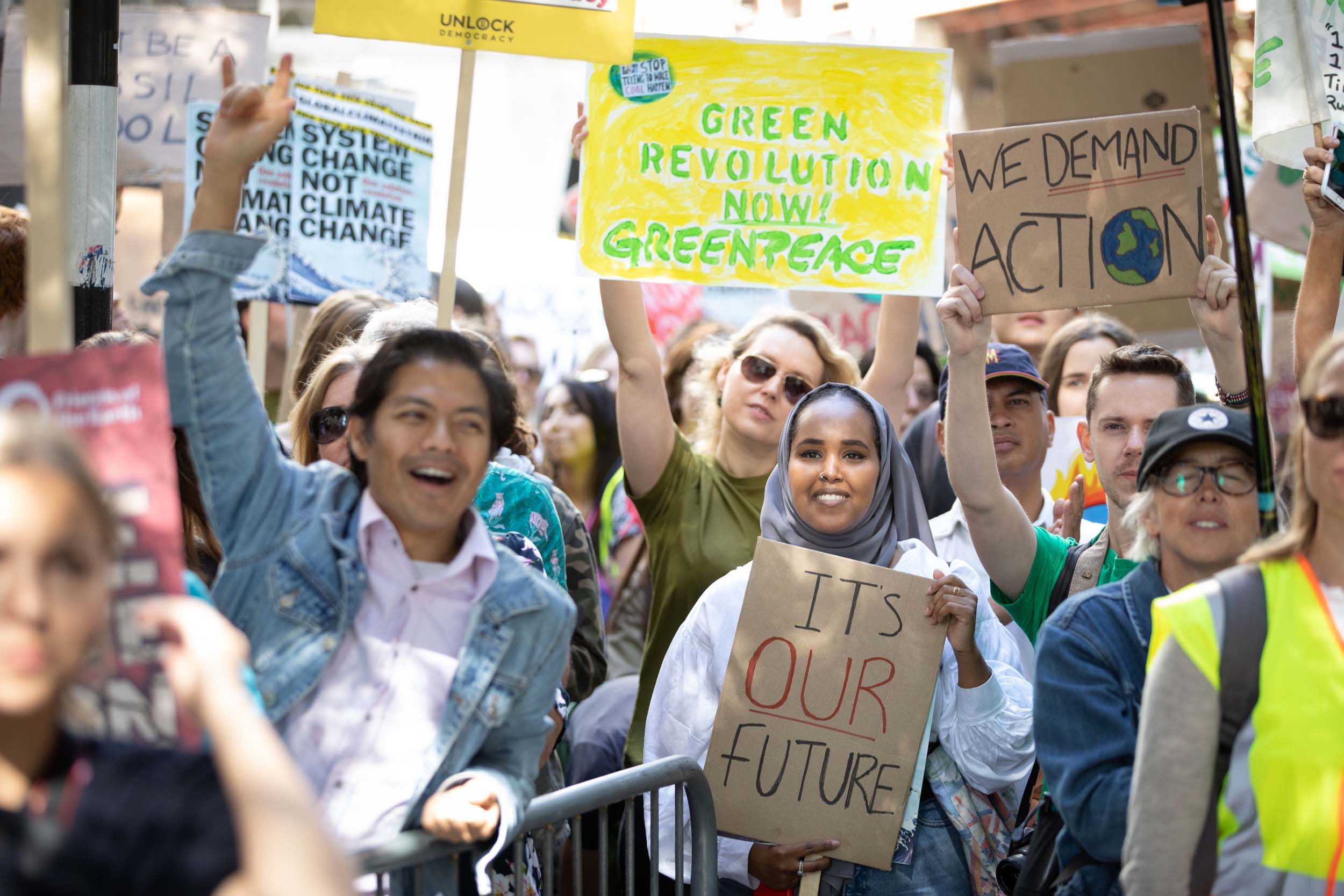
Young people and adults in London take to the streets during a global climate strike, calling on governments to act on the climate crisis. © Suzanne Plunkett / Greenpeace
We also worked behind the scenes with the youth strikers, focusing on capacity building and bolstering its efforts to mobilise the public ahead of the largest day of climate action in UK history. We helped build UKSCN a new website, placed ads in newspapers and helped produce videos which were seen over three million times, mainly by new audiences. By creating these videos and other digital content, and by using our online channels, we helped the youth strikers’ UK mailing list grow from 1,500 to 28,000, setting the network in good stead for the future.
We also worked with Extinction Rebellion, organising activist training, logistical support and resources. And as the UK geared up to the general election, our focus was on ensuring the environmental movement spoke with a united voice.
Volunteers from our political lobbying network jointly organised hustings events with local organisers from XR and Friends of the Earth. As a result, thousands of people quizzed parliamentary candidates on the climate and wider environmental issues.
Alongside these newer partnerships, we continued to lead coalitions working with big environmental charities too. Following on from the publication of the Greenpeace climate manifesto in July, we drafted a report calculating that 5% of all government spending is needed per year over the next three years to start tackling the climate and nature emergency on the scale required. We used this report to jointly lobby the new government, and 30 different partner organisations from WWF to Oxfam engaged with the chancellor on the issue.
Thanks to our efforts, awareness of the need to significantly increase green spending is building in government. It’s another example of how our work to align the sector and maximise collective strength is paying off.
Unearthed: leading the way for environmental journalism
Once again in 2019, our dedicated team of investigative journalists exposed the big environmental stories that politicians and companies want to keep hidden. Unearthed Editor Damian Kahya recalls some of the year’s biggest revelations.
In a year when the ever-changing Brexit narrative dominated the UK news agenda, the critical role that investigative journalism plays in holding power to account was clearer than ever. Indeed, one of the many Unearthed stories picked up by mainstream top tier media in 2019 involved a government minister seeming to consider weakening environmental standards after the UK’s exit from the European Union.
In August we exposed how the new international trade secretary, Liz Truss, had travelled to Washington DC when she was working for the Treasury in 2018, for “off-the-record” meetings with climate-sceptic think tanks. She also met the chief economist of a controversial lobbying group during the trip, to discuss Donald Trump’s efforts to slash environmental regulations.
Following on from this story, we obtained a leaked government document detailing how a trade deal with the US would affect food and environmental standards in the UK. The story was featured in the Financial Times and on the Today programme, shared widely online, and even raised as a question during a debate in parliament – one of many Unearthed stories that went on to inspire wider scrutiny in 2019.
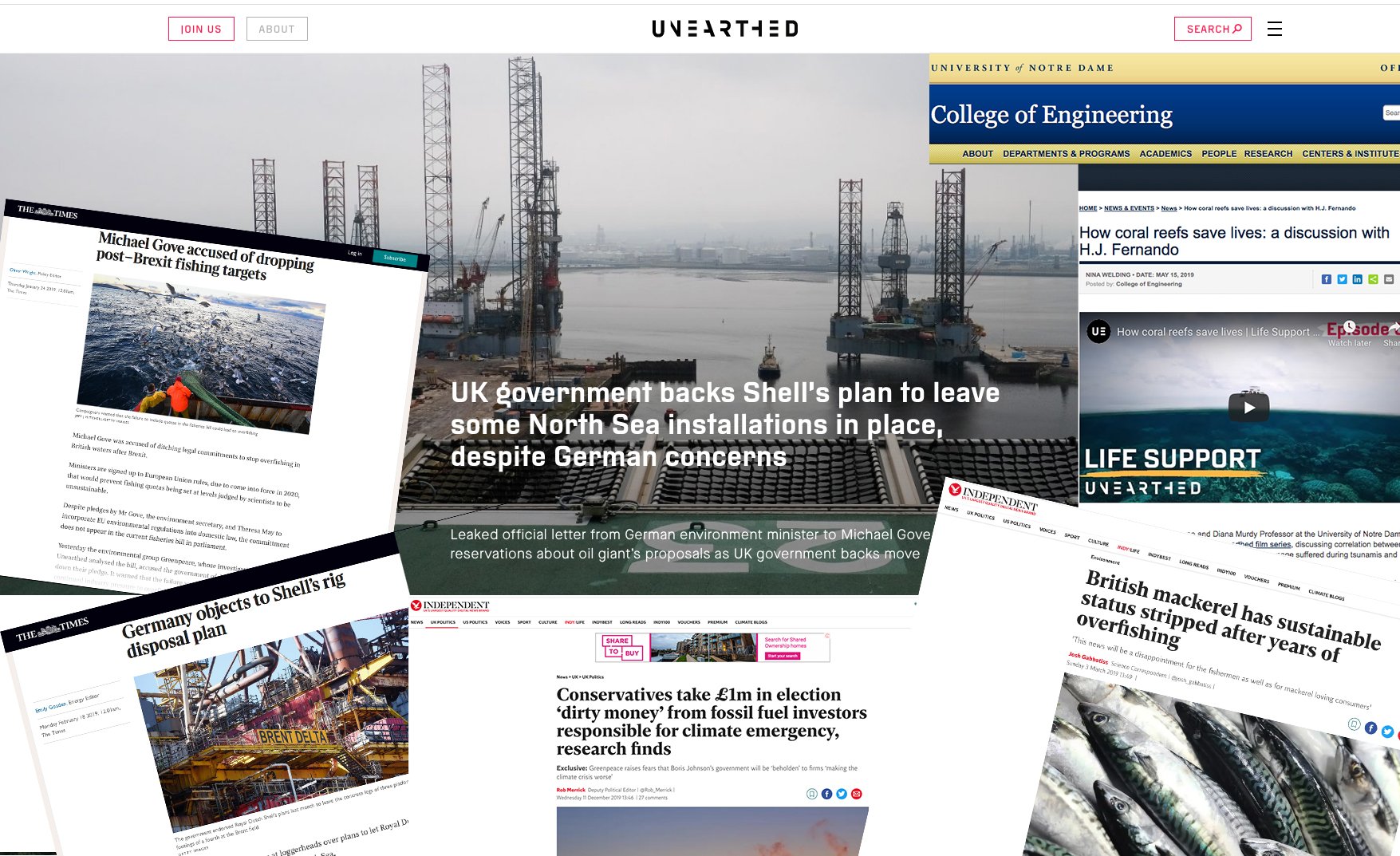
The same could be said of our joint undercover investigation into a London recycling centre, where an Unearthed journalist repeatedly saw recyclable items being sent to incinerators – a clear sign of why cutting production, rather than recycling, should be the focus of efforts to stem the tide of single-use plastics.
Further afield, another major investigation found ExxonMobil and BP to be among the worst culprits for “flaring” – when natural gas is burned off with no economic benefit – in the biggest US oil fields. The findings called into question both companies’ pledges to drastically reduce flaring. Our analysis of official industry data, which was published in the New York Times, showed that flaring in these fields created the same annual emissions as 10 coal-fired power stations.
In Brazil, meanwhile, we began gathering first-hand accounts as soon as the Amazon fires started to spread, as well as reporting on the visit of Brazil’s environment minister Ricardo Salles to the UK. That story was shared more than 21,000 times on Facebook.
Further Unearthed pieces questioned why environmentally protected areas and Indigenous communities in the country had been hardest hit, with both the Financial Times and the BBC following up our findings in interviews with Salles.
Again and again in 2019, Unearthed identified the unseen stories of our planet in peril – and those responsible were left with nowhere to hide.
“Great study, proving once again that you cannot trust @exxonmobil and @BP_plc.”
Global impact
Stories of Greenpeace campaign successes around the world
Chile
Indigenous groups have successfully prevented seafood company Nova Austral from expanding salmon farming in the pristine fjords of southern Patagonia. The area is home to dolphins, whales and penguins, and Indigenous groups were concerned that the introduction of non-native salmon would threaten local ecosystems. Greenpeace helped local communities to launch a legal appeal preventing the release of baby salmon, and Nova Austral subsequently removed its sea pens from the area.
Democratic Republic of Congo
After the DRC government committed to allow 50 areas of forest to be run by local communities and Indigenous groups by 2023, the people of Lokoloma village joined with Greenpeace to apply for their own forest concession. In March, the community was allocated 11,000 hectares of land, enabling people to manage the land sustainably, safe from industrial loggers. As local chief Joseph Bonkile explained: “We will be the ones watching over our forest.”
Europe
As we piled pressure on fossil fuel companies to transform their businesses and shift to renewables, European governments reached a deal that means the European Investment Bank will stop funding most fossil fuel projects by 2021. Though the deal means some gas developments will still be eligible for financing, the move still sends a strong signal to the energy sector and the global financial community that the age of fossil fuels is coming to an end.
India
There was reason for cautious optimism in January as India’s Ministry of Environment, Forest and Climate Change published the country’s long-awaited National Clean Air Programme. Greenpeace India campaigned for three years for a plan to be released, and though the document lacked much-needed targets for reducing pollution in specific cities and economic sectors, it remains an important first step towards holding the government to account on its clean air promises.
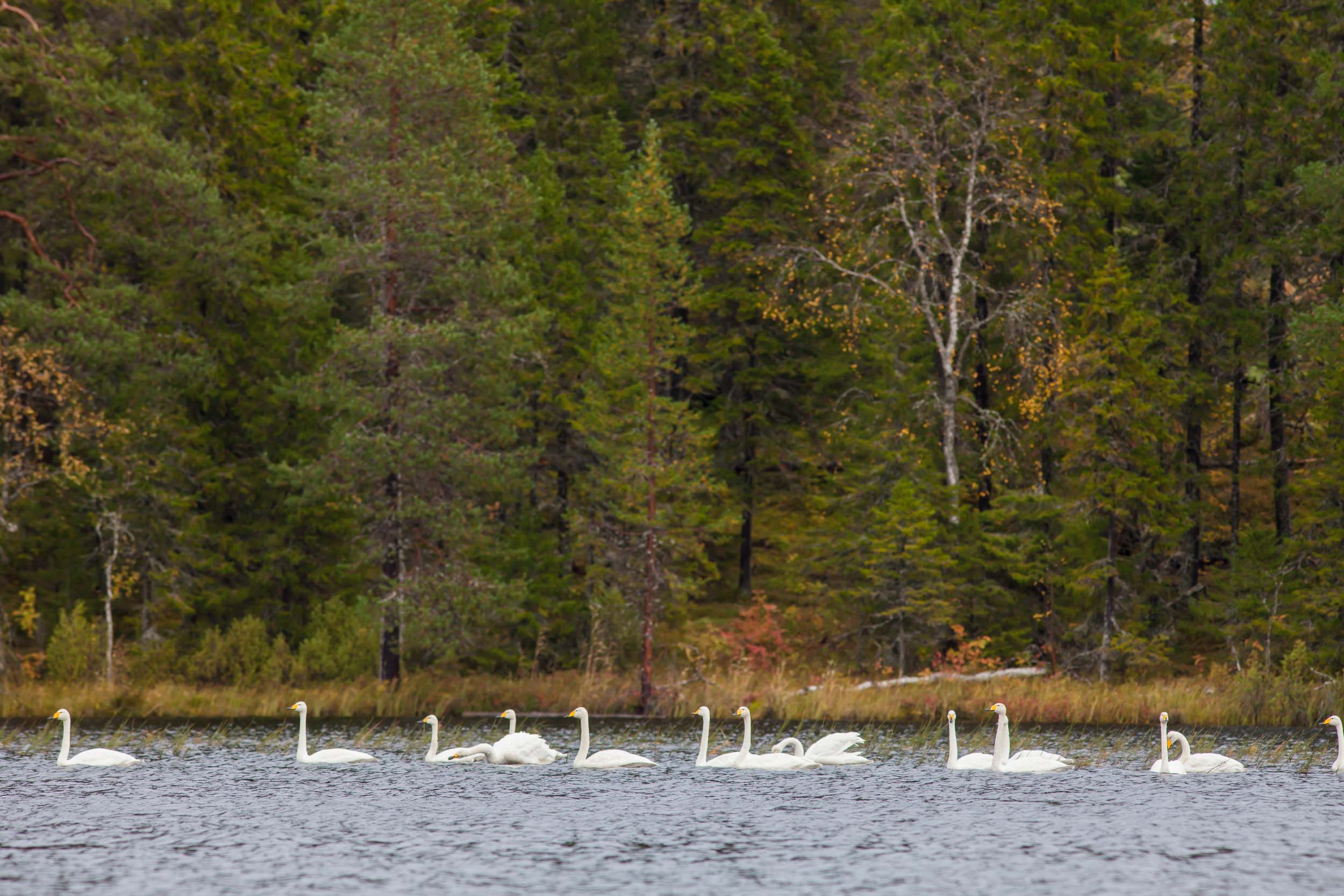
Whooper swans on a lake in the Dvinsky Forest, Russia, a biodiverse region in urgent need of conservation status. © Igor Podgorny / Greenpeace
Indonesia
Back in 2016, Arie Rompas, now Forest Team Leader at Greenpeace Indonesia, was one of seven Indonesians who successfully took the country’s government to court, arguing that authorities had not done enough to prevent devastating forest fires. Last year, the Supreme Court of Indonesia rejected an appeal filed by the country’s President Joko Widodo and upheld the verdict in favour of Arie and his co-complainants. The determination of Greenpeace supporters leaves politicians nowhere to hide.
Norway
It’s been three years since we showed how industrial fishing fleets were expanding bottom trawling in the Norwegian Arctic. We secured an industry commitment at the time to stop the expansion of trawling – and have been working with Russian and Norwegian fishing companies ever since to achieve further progress. In April 2019, all that work came good – as regulations limiting bottom trawling and protecting vulnerable marine ecosystems were signed into law. Long-term pressure works.
Russia
After two decades of pressure from Greenpeace Russia and other environmental NGOs, Russia has established one of its largest nature reserves. The Dvinsko-Pinezhsky reserve, a boreal forest wilderness, measures 300,000 hectares and will provide crucial protection in an area devastated by logging in recent years.
Spain
After campaigners from Mexico to Madrid staged peaceful protests telling BBVA to pull the plug on tar sands investments, the Spanish bank listened and added the transportation of tar sands to its list of prohibited activities. Tar sands pipelines threaten rivers, ecosystems, Indigenous rights and our climate. But in the face of worldwide pressure and a Greenpeace petition signed by 400,000 people, BBVA knew it had to respond.
Funding our mission
Your support makes our independence and impact possible, says Karen Rothwell, Director of Fundraising.
Greenpeace stands for positive change through action. Exactly what that action involves – from petitions, to political pressure, to investigation and peaceful protests – depends on what is likely to achieve the greatest impact. But the generosity of supporters like you makes it all happen.
We don’t take money from governments or companies. Never have. Never will. Instead, we honour your support by spending every penny you give us with great care.
Thank you so much for standing with us, and with our planet.
Where our money came from
What we spent it on
These are the combined accounts of Greenpeace UK Ltd and Greenpeace Environmental Trust, which funds the promotion of sustainable development, scientific research, investigations and educational projects that further our understanding of the effects of human activity on the natural environment. If you would like to enquire about making a charitable gift to Greenpeace through a Foundation or Trust, please contact Louise Krzan on 020 7865 8175.
Thank you
We can’t thank you enough for your support. As the pressures on our planet keep on growing, your support makes all of the progress in this report possible.
We would like to acknowledge the following individuals and organisations for their generous contributions in 2019:
- Adam & Be Balon
- Alerce Trust
- Alex Dale
- Anne Hess
- Ashden Trust
- Birthday House Trust
- Brian Gaze
- Britta & Jeremy Lloyd & family
- Bryony Dahl
- Charities Aid Foundation (CAF)
- Emily Feldberg and Elizabeth Atkinson
- European Climate Foundation
- Finance Dialogue Group
- Fondation VRM
- Frederick Mulder Foundation
- Geraldine Harmsworth
- Grace Fund/Jorge & Lindsey Villon
- Greg & Sam Nasmyth
- Henocq Law Trust
- James Gibson Charitable Trust
- James McGrane
- Jamma International
- John Ellerman Foundation
- John Peck and Bindy Saywood
- Julia Davies – We have the POWER
- Keith Clarke CBE
- Levine Family Foundation
- Martin & Åsa Hintze
- Matthew & Audrey Lawfield
- Michael Hirst
- Mick Braddick
- Moondance Foundation
- Paul Goodenough
- Paul Strasburger
- Peter Staples
- Players of People’s Postcode Lottery
- Randall ‘Randy’ Chambers
- Reed Family Foundation
- Richard Coates
- Roger de Freitas
- Roger Ross & all at Lots Road
- Simon Franks
- Sir Quentin Blake
- Susie Hewson-Lowe
- The Adlard Family Charitable Foundation
- The Esmee Fairbairn Foundation
- The Laura Kinsella Foundation
- The Mitchell Trust
- The Orp Foundation
- The Peter Smith Charitable Trust for Nature
- The Reta Lila Howard Foundation
- The Ridgeback Trust
- The Tinsley Foundation
- The Underwood Trust
- The Waterloo Foundation
- The Wright Family Foundation
- Thirty Percy
- Tony Duburcq and The Green Trust
- Val Carlill
- William Scragg
A powerful legacy
Every year we are honoured to receive gifts from supporters who include Greenpeace in their Will. We would like to pay tribute to the compassion and generosity of the following people:
- Frances Joan Allan
- Peter Benson
- Beryl Frances Brant
- Peter David Brereton
- Sheila Rose Bright
- Alan George William Brown
- Colin Victor Clarke
- Philip John Cook
- June Darby
- Pamela Joyce Dean
- James Dixon
- Walter Dyriw
- Sally Clarissa Ebbs
- Peter Ben Foley
- Harry George Geering
- Sylvia Gillings
- David Brian Hartley
- Higham Ronald David Hayman
- Susan Hessey
- Christina Elizabeth Hyde
- Derek Charles Jenkins
- Kenneth Arthur Johnson
- Hortense Jones
- Josephine Faniella Klein
- Catherine Stuart Laing
- Ellen Marea Litster
- John Mangold
- David Clive Matthews
- Sheila McNamee
- George MacDonald McNeil
- Reginald Mead
- Stephen Legh Meredith
- Elizabeth Gay Kitson Mills
- Stanley Milne
- Anthony Joseph Murphy
- Curtis Hilton Stewart Nash
- Joyce Cecile Ord
- Pauline Owen
- Audrey Ann Pickles
- Irving Stanley Rappaport
- Paul Murray Raven
- John Rothenberg
- Alberto Sergio Sabbatino
- Ruby Smith
- Rosemary Mildred Smith
- Gillian Lesley Summers
- Clare Sutcliffe
- Ena Faith Thear
- Christian Wangler
- Dian Wardle
- Joan Henrietta Withers
- Plus 65 others …
A special thank you
In recent years, awareness of the ocean plastic pollution crisis has skyrocketed – but much less attention has been given to the impact of plastic pollution closer to home, in our rivers and waterways here in the UK. In 2019 we were able to make great progress towards changing this, thanks to support from players of People’s Postcode Lottery. Thanks to this extra funding we were able to carry out the biggest ever survey of plastic pollution in UK rivers visiting 30 locations across 13 rivers in urban and rural locations. The samples were then taken to Greenpeace’s laboratory for testing and analysis. What we found surpassed our worst expectations: plastic pollution in every river, with one river – the Mersey was so polluted that it has proportionally twice as much plastic as the Great Pacific Garbage Patch.
Our landmark scientific report ‘Upstream: Microplastics in UK Rivers’ was launched at the House of Commons at a packed event calling for plastic reduction targets in the upcoming UK Environment Bill. Over 200 MPs backed our plastic reduction target and dozens shared the campaign on social media. This level of political support – particularly cross-party – is rare, and shows that action on plastic pollution is finally – thanks in no small part to our efforts – becoming a politically mainstream position.
Our petition calling for the government to reduce single-use plastic was signed by 150,000 people—over 20,000 of whom had never been involved with Greenpeace before. And our research findings secured influential media coverage, from pieces in The Telegraph and The Times to The Daily Mail – as well as lots of TV and radio coverage. This project helped to shift the press narrative away from recycling as the only solution and towards reduction and reuse – a really important step in pushing politicians to act.
This project was made possible thanks to funding raised by players of People’s Postcode Lottery.


